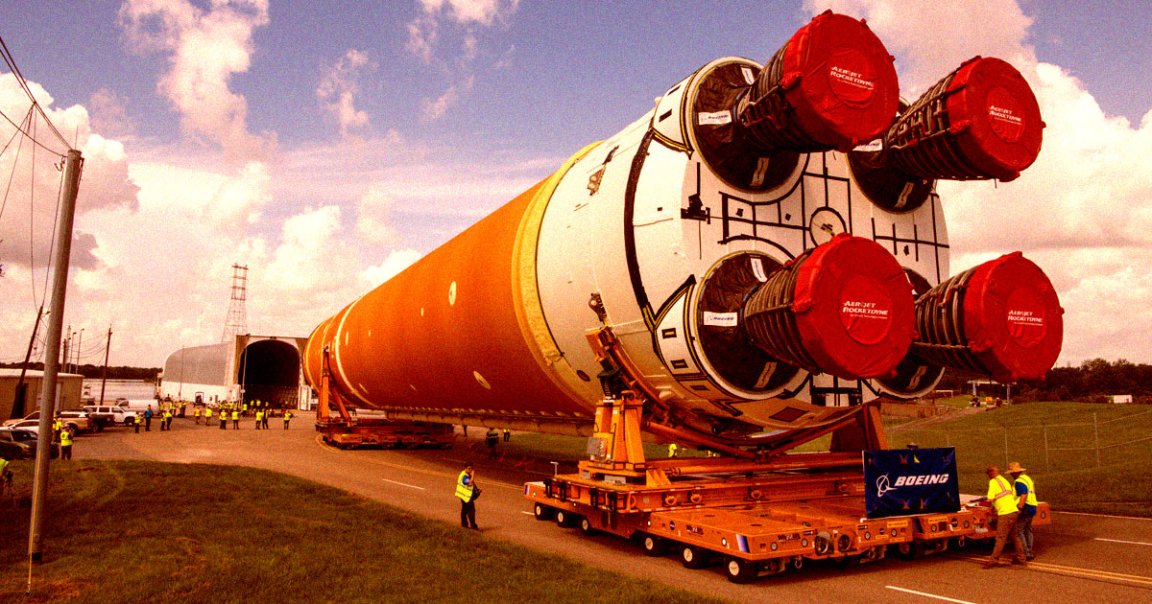
Aerospace giant Boeing is warning that hundreds of workers currently working on NASA’s Artemis Moon rocket could be laid off in the upcoming months.
A Boeing spokesperson told The Register that “to align with revisions to the Artemis program and cost expectations, we informed our Space Launch Systems team of the potential for approximately 400 fewer positions by April 2025.”
The notifications were intended to give workers a more than 60-day notice in advance of mass layoffs, to adhere to the Worker Adjustment and Retraining Notification (or WARN) Act.
“We are working with our customer and seeking opportunities to redeploy employees across our company to minimize job losses and retain our talented teammates,” the statement reads.
The Space Launch System (SLS), an expendable heavy-lift launch vehicle that’s been in the works for well over a decade, has already experienced years of delays — not to mention billions of dollars in budget overruns.
Now that SpaceX CEO Elon Musk has become an integral part of the US government’s operations, where he’s actively looking for places to slash the budget with the help of his so-called Department of Government Efficiency, the rocket could soon land on the chopping block.
Musk has already hinted at scrapping NASA’s Moon program, tweeting in December that the “Moon is a distraction” and that “we’re going straight to Mars” instead.
At the time, Musk argued that the “Artemis architecture is extremely inefficient, as it is a jobs-maximizing program, not a results-maximizing program,” in a separate tweet. “Something entirely new is needed.”
That’s despite NASA still hoping to launch the rocket as part of its Artemis II and III missions in 2026 and 2027, respectively, culminating in the first human landing attempt on the Moon in over half a century.
NASA released a statement over the weekend, reaffirming its commitment to the rocket as an “essential component” of its Artemis program.
“NASA and its industry partners continuously work together to evaluate and align budget, resources, contractor performance, and schedules to execute mission requirements efficiently, safely, and successfully in support of NASA’s Moon to Mars goals and objectives,” a spokesperson told Ars Technica‘s Eric Berger. “NASA defers to its industry contractors for more information regarding their workforces.”
The agency’s upcoming Artemis launches are highly technical in nature and involve a laundry list of contractors, most notably Musk’s SpaceX.
As currently planned, Artemis III will make use of the firm’s Starship, which will be used to lower astronauts down to the lunar surface.
Whether the SLS will be swept up in the SpaceX CEO’s efforts to slash massive swathes of the government’s budget remains to be seen, but given the inherent conflict of interest, it’s certainly a possibility.
President Donald Trump also supports the idea of “launching American astronauts to plant the Stars and Stripes on the planet Mars,” according to his inauguration speech last month.
However, the Trump administration has yet to comment on the fate of NASA’s Artemis program, which was established during Trump’s first presidency.
Musk has also yet to reveal what he meant with his plans for “something entirely new,” if there are any, to begin with.
Given Boeing’s latest fidgetiness, NASA’s stalwart contractors are getting cold feet, and starting to wonder if Artemis will even exist by the end of the year.
But as Berger writes, there “has been a healthy debate within the White House and senior leadership at NASA” about a “future of the SLS rocket and the Artemis Moon program.”
Besides, if the SLS were to be canceled or radically changed, it’d be a highly unpopular move in Congress, as SpaceNews points out.
More on Artemis: Elon Musk Trying to Scrap NASA’s Moon Program